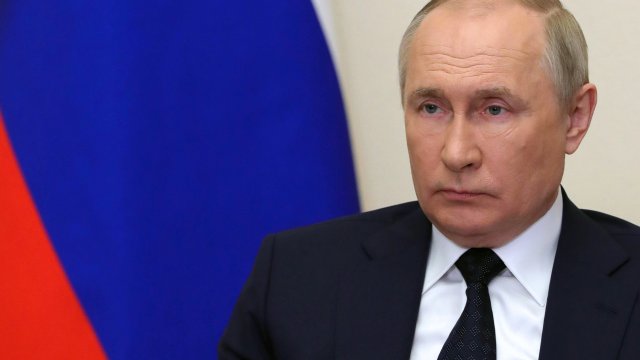It’s called Vladimir Putin’s shadow army, and it’s done his dirty work before.
In 2014, the Wagner Group entered Ukraine undercover, destabilizing the eastern Donbas region and helping to seize Crimea.
Now 1,000 mercenaries from the private Russian military company are massing in Ukraine, according to U.S. and British intelligence.
"Where they're all coming from, I don't know," Pentagon Press Secretary John Kirby said. "We have seen indications that the Wagner Group is recruiting in places like Syria and places like northern Africa, Libya, but how many are of that thousand or so or where they're, I just, I don't have that level of detail."
Syria and Libya are just some of the places Wagner forces have deployed. Their track record includes looting natural resources, destabilizing governments, rape, torture and executions. Their name comes from Russian commander Dimitri Utkin’s fondness for Nazi iconography and a nod to Hitler’s favorite composer, Richard Wagner.
In a sign that this secretive force has already entered the war, videos are emerging of objects with swastikas in Ukraine’s soil.
The director of the U.K.’s electronic surveillance agency says Wagner forces will augment Russian troops, following grave military losses.
"We’ve seen Russian soldiers – short of weapons and morale - refusing to carry out orders, sabotaging their own equipment and even accidentally shooting down their own aircraft," said GCHQ director Jeremy Fleming.
The mercenaries come as Western intelligence concludes Putin distrusts his military leaders and has advisers who are too afraid to inform him of sweeping losses in Ukraine. Former intelligence officers say the Wagner Group is another mechanism to carry out Putin’s political ends.
"In 2012, Vladimir Putin himself told the Russian Duma, their parliament, that paramilitary groups such as Wagner can serve a state purpose," said Paul Kolbe, former central Eurasia division chief at the CIA. "They can serve foreign policy goals, they can influence, and they can provide mechanisms that are useful to the state that don't appear to be part of the state."
Fighters have trained at camps attached to Russia’s military intelligence service in Krasnodar, southern Russia, and experts say they often don’t know what they’re signing up for.
"It was not on the job seeking sites, 'We're going to send you to Syria to fight the Free Syrian Army or ISIS,' it didn't work that way," said Michael Weiss, news director at New Lines Magazine. "They were only told once they had gone through the recruitment protocols what they were actually getting themselves involved in."
The Pentagon says Russia is now prioritizing the Donbas in the East, where Wagner forces will fight by their side. But Ukrainians are expected to mount a fierce defense against Putin’s paramilitary.
"If he does send in, you know, 5,000 Wagner troops, probably Ukrainian forces could manage that without too much problem," said John Herbst, former U.S. ambassador to Ukraine.


